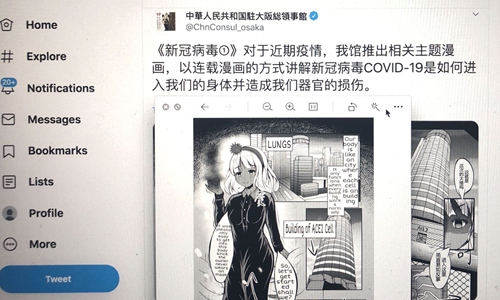Cultural products popularize tips on COVID-19 prevention
By Ji Yuqiao Source:Global Times Published: 2020/3/12 17:48:40

Tweet of the Consulate Genral of China in Osaka. Photo: Ji Yuqiao/ GT
To help popularize preventive measures of the COVID-19 epidemic, a variety of cultural products including comics and TV series with various local features have been produced around the world.As the epidemic continues to spread rapidly, informing people of how to correctly avoid being infected has become an urgent mission in many countries, especially those with increasing numbers of confirmed cases such as Italy, Japan and the US.
The Consulate General of China in Osaka, Japan launched a series of COVID-19-themed comics on Wednesday on Twitter to introduce the impact the deadly virus has on the human body.
The tweet noted that the comic strips aim to explain how the virus enters the human body and causes organ damage.
The first issue is two pages long and has captions in Chinese. The virus is portrayed as a woman in the comics and human cells are depicted as a large building.
"This person never wears a face mask, so it will be easy to enter their lungs," the virus says in the comic. She adds that she has already cracked the password of the building's gate and can easilygo into it.
The caption explains that the COVID-19 virus has evolved spines that match the receptors on the surface of lung cells, so it can easily enter these cells.
These comic strips are well-received by netizens, who praised them for turning complex and abstract medical knowledge into a simple and straightforward comic.
"I cannot wait to see the next issue. Please update more quickly," one netizen wrote on Twitter.
Some netizens have even gone an extra step and translated the comics into English and posted them on social media.
Many netizens have suggested that the Consulate General in Osaka launch a Japanese version and other versions to better popularize epidemic-related information.
The consulate isn't the only one producing educational content.
US video platform Netflix recently released a group of photos about the appropriate distance people should keep during the epidemic based on the stage photos of the divorced couple in the film Marriage Story.
The humorous photos show the divorced couple speaking to each other from different rooms or sitting apart from each other on the subway as examples of how people should do themselves with others.
Chinese netizens were drawn in by these photos on Sina Weibo.
"The fame of this film can remind more people how to be safe. And if the couple could have worn face masks in the photos,it would have been even better," one Chinese netizen commented.
China's intangible cultural heritage has also joined in on the action.
In a show of palm puppets from Jinjiang, East China's Fujian Province, the puppets wear face masks as they tell a series of stories about the epidemic from the perspective of an ordinary family in Jinjiang, persuading people to stay at home or to take appropriate measures when going outside.
"Compared with traditional guidelines issued by governments and medical experts, these relaxed cultural products are more approachable to ordinary people," a chief doctor working at a hospital in North China's Shanxi Province, who asked to remain anonymous, told the Global Times on Thursday.
"People can acquire correct prevention tips while also being entertained by these comics, TV shows or music videos as long as the tips are scientific and accurate, using relaxed artworks is brilliant," he added.
A Beijing resident surnamed Fang also said that when he sees interesting artworks about preventive measures, he always stops to read them carefully.
"They allow me to better understand how to protect myself from the virus while entertaining me. It is killing two birds with one stone."
Posted in: RELATIONSHIPS,CULTURE & LEISURE,ARTS FOCUS